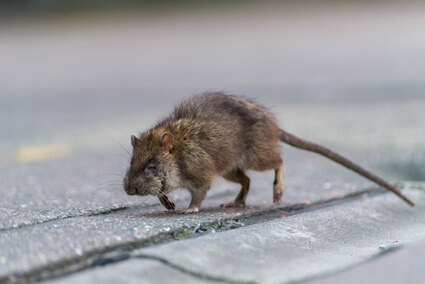Rats are nocturnal animals, more active at night than during the day. So, they’ll spend their time sleeping or hiding away when the sun’s out. However, that doesn’t mean you’ll never see a rat during the day.
If a rat is poisoned, it may be delusional, dehydrated, or unable to rest, causing it to emerge during the day. If the nest has been disturbed by bad weather, infighting, or predators, rats will have little choice but to emerge. A rat may venture out during the day when hungry or unthreatened.
Sighting many rats in broad daylight can signify a heavy infestation due to overcrowding. Rats can adapt to whatever sleep schedule is necessary, but they consider it safer to move and forage when it’s dark.
Do Rats Prefer Light Or Dark?
Given a choice, rats prefer darkness over light, as they’re biologically hardwired to thrive at night.
Rats have enlarged eyes with wider pupils, which enhance their night vision. This allows them to see in near-complete darkness and low lighting.
This is paired with excellent olfactory senses, which rats use to locate food. Their good hearing ensures they navigate through the dark, hearing their movements, other rats, and predators.
Rats have dark-colored fur that blends well in shadows. Their coats are usually black, brown, or grey. So, their camouflage is most effective at night. Their scurrying movements are more likely to be detected against bright colors and stark lighting during the day.
Since rats are small prey animals, avoiding dangers is better than fighting them off.
Are Rats Nocturnal Or Crepuscular?
Like most rodent species, rats are nocturnal animals, so they’re most active at night. In contrast, crepuscular animals are most active at dusk (evening) and dawn (early morning before sunrise).
The cooler temperatures at dusk and dawn suit crepuscular animals to hunt and avoid predators. They spend the night sleeping or doing less demanding activities.
Nocturnal animals like rats are more active at night because of their environmental adaptations. Searching for food at night allows them to scavenge while remaining unnoticed.
Rats are instinctively nocturnal but can become crepuscular to adapt to their current environment.

Why Do Rats Come Out In The Daytime?
Rats are primarily nocturnal animals, but certain situations may cause a rat to forgo that instinct and come out during the day:
Food And Water
If a rat’s starving or dehydrated, it may forage for food during the day.
It understands it won’t survive long if it only searches for meals at night when food is scarce or unavailable. Its basic need for hydration and sustenance drives it to search constantly.
Day or night, rats will look for scraps, chew on inedible objects, and expand their search beyond their usual territory. A starving rat will look for food in riskier environments and broad daylight.
It has no other option but to search for food during the day to survive.
Disturbed Nest
Rats may be forced to emerge in daylight if a predator has disturbed their nests. Flooding caused by heavy rain can also cause rats to vacate their nests so they don’t drown.
Since rats use their nests to sleep, recuperate, and raise their young, they prefer to stay there during the day. If the nest is flooded, destroyed, or threatened, rats will flee to find safety and return later.
Threats From Predators
If a predator finds a rat’s nest or temporary resting place, its priority will be to escape. This can cause it to flee to the open during the day to escape the threat.
Infighting
Rats may live in colonies, but they can be territorial and aggressive. So, wild rats may fight among themselves over food, water, mates, space, and general irritation.
This in-fighting can lead to a rat fleeing its nest for safety or being ejected.
Poisoning
If a rat is poisoned, it’ll become overwhelmingly thirsty, sick, and delusional. Rodenticides dehydrate rats, forcing them to contend with extreme thirst. Also, poisons impair their judgment and mobility.
Human Activity
Rats often move around at night to avoid humans, but human activity can also force rats to come out during the day. Their goal will always be to avoid people.
According to BioEssays, wild rats avoid human interaction even though domesticated rats have developed a commensal relationship with us. The rats will dash for safety if they see a human around.
Safe Environment
If a rat feels no danger in venturing out during the day, it’ll do so without hiding. For example, rats often come out in abandoned buildings during the day and night.
Severe Infestation
If you find rats out during the day, it may be because there’s a large infestation.
Overcrowding forces even the most cautious rats to brave the daylight because they’ll be pushed out by the other rats, often larger colony members.
Also, rats will search for new places to build additional nests to expand their fast-expanding colony.

Why Do Rats Avoid Coming Out in Daylight?
Rats are nocturnal because their bodies have adapted from an evolutionary and survival standpoint.
Here are the advantages of avoiding daylight:
- Larger creatures that rats want to avoid (like humans) prefer moving around during the day.
- Darkness provides better cover for scurrying around undetected.
- Rats have superior night vision, which allows them to navigate better in the dark. Unlike many other creatures, this gives rats a significant edge.
- Some food is only available or unguarded at night.
- Nighttime is quieter, making hearing predators, small prey, and each other easy.
Even if rats can adapt to being active during the day, it’ll be a willful adaptation, not instinctual.
The instinct to favor the night is best exemplified by how rats communicate. Rats use high-pitched sounds to locate one another.
These high-frequency sounds are only audible to them at night since daylight hours can be noisy.
Is It Normal To See Rats During The Day?
According to the University of Bristol, rats exposed to light conditions are less active due to increased anxiety-related behaviors. This explains why rats run away when you turn on the lights.
If you see a rat during the day, it’s desperate, or its nest is overcrowded. Less commonly, seeing a daytime rat is a one-off incident, as it was driven out by infighting or nest disturbance.
There are still times when rats willingly forage during the day instead. This happens if they find safer routes to food sources that they can use, as rats are motivated by the need to survive.








